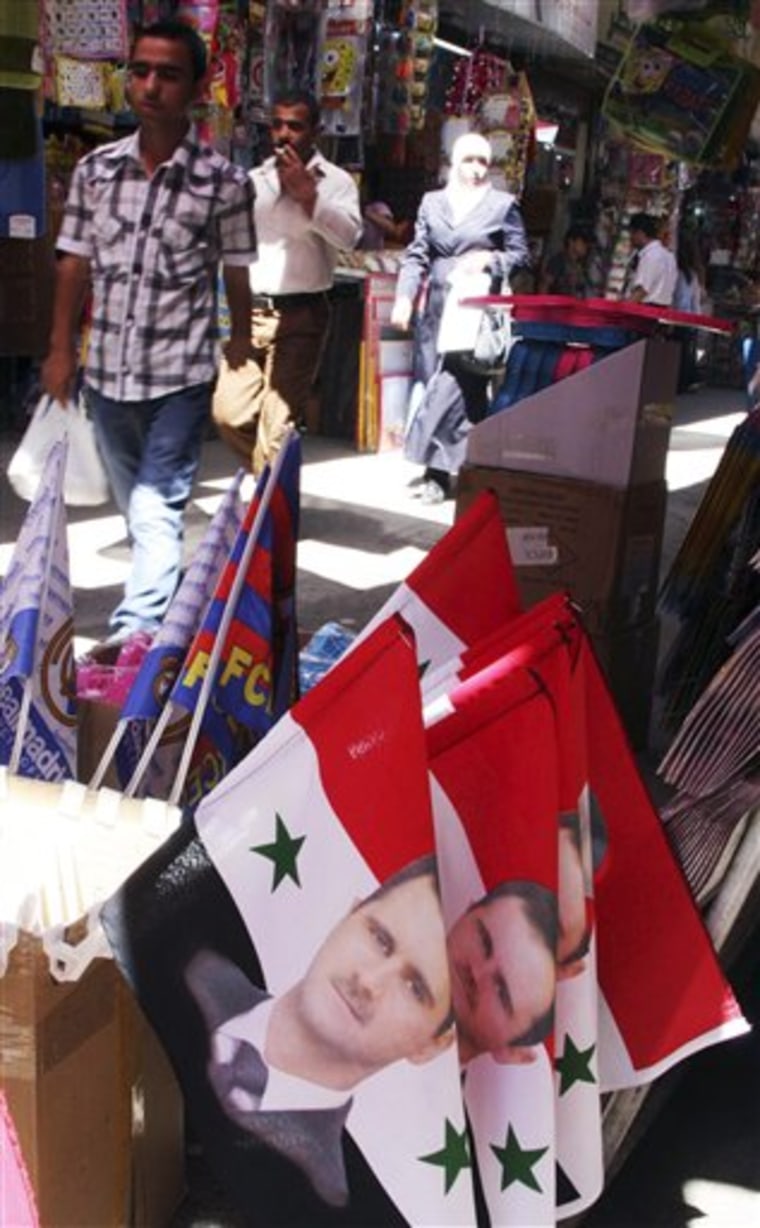The U.N. children's agency UNICEF called on Syria on Tuesday to investigate reports of "horrific acts" of violence against children detained during the current wave of unrest in the Arab country.
The call came after The New York Times reported on Monday that an online video showed a 13-year-old boy, arrested at a protest on April 29, who it said had been tortured, mutilated and killed before his body was returned to his family.
Protests against the rule of President Bashar al-Assad broke out in southern Syria in March and have spread across the country. Human rights groups say 1,000 civilians have been killed and 10,000 arrested in a government crackdown.
In a statement, UNICEF said use of live ammunition against demonstrators had reportedly killed at least 30 children, although it said it could not independently confirm that figure or the circumstances of their death.
The agency said it was "particularly disturbed by the recent video images of children who were arbitrarily detained and suffered torture or ill-treatment during their detention leading in some cases to their death."
"We call on the government to thoroughly investigate these reports and ensure that perpetrators of such horrific acts are identified and brought to justice," it added.
UNICEF did not specifically cite the case reported by The New York Times, involving Hamza Ali al-Khateeb, arrested in Jiza, a village near the southern city of Deraa, where the protests first erupted.
Video posted online (link requires a sign-in because of the graphic nature of the images) shows his battered, discolored face. His skin is scrawled with cuts, gashes, deep burns and bullet wounds that would probably have injured but not killed, The New York Times reported. According to an unidentifed narrator, his jaw and kneecaps are shattered, and his penis chopped off.
“These are the reforms of the treacherous Bashar,” the narrator says in the video. “Where are human rights? Where are the international criminal tribunals?”
Relatives told Al Jazeera that the boy's parents were shocked when they saw their boy, who reportedly spent about a month in the custody of Syrian security forces.
"When Hamza's mother came to see the body she was only shown his face," a cousin, who was present at the time, told Al Jazeera.
"We tried to tell the father not to look, but he pulled the blanket back. When he saw Hamza's body he fainted. People ran to help him and some started filming - it was chaos."
The reported torture demonstrates a "total collapse" of the Syrian government's willingness to listen to its people, U.S. Secretary of State Hillary Clinton.
"President Assad has a choice, and every day that goes by the choice is made by default. He has not called an end to the violence against his own people, and he has not engaged seriously in any kind of reform efforts," she added.
"Every day that goes by the position of the government becomes less tenable and the demands of the Syrian people for change only grow stronger," Clinton said.
UNICEF reminded Syria Tuesday that as a party to the 1990 U.N. Convention on the Rights of the Child, it was bound to ensure children's right to life, to freedom of expression and peaceful assembly, and protection from violence, exploitation and abuse.
It said the government had a primary responsibility for the well-being of those affected by the unrest and a duty to ensure continuation of basic social services.
The UNICEF statement was one of the strongest issued by any U.N. body on the situation in Syria. The U.N. humanitarian division OCHA has failed to win permission from Damascus to send teams to cities attacked by government forces.
Western countries are trying to get the U.N. Security Council to adopt a resolution condemning the Syrian government but have met objections from Russia and China, which both hold vetoes in the 15-nation council.
Meanwhile, Syrian President Bashar al-Assad issued a general amnesty on Tuesday, state television said, after 10 weeks of protests against his 11-year rule and a military crackdown which has drawn international condemnation.
The amnesty covers "all members of political movements, including the Muslim Brotherhood," it said. Membership of the Brotherhood, which led an armed uprising against Assad's father in 1982, is punishable by death in Syria.
Assad's move was the latest in a series of reforms -- including lifting a 48-year state of emergency and granting citizenship to stateless Kurds in eastern Syria -- aimed at addressing grievances of protesters.
But those steps have been accompanied by a ruthless military crackdown in which rights campaigners say 1,000 civilians have been killed and more than 10,000 people arrested.
Activists said at least five people were killed on Tuesday when tanks shelled the central town of Rastan and security forces stormed Hirak, a town in the southern Hauran Plain where the uprising first broke out in mid-March.
Syria blames the violence on armed groups, Islamists and foreign agitators, saying more than 120 police and soldiers have been killed in the unrest nationwide.
